
Latest Coronavirus Disease COVID 19 News and Research
New tool could help prevent and reduce the number of coronavirus cases
One of the most effective measures for containing the transmission of a virus is to identify who an infected person has been in contact and/or crossed paths with, mainly during incubation periods.
New project uses SMART-TRIAL to gather data on Iceland's wellbeing during COVID-19 pandemic
A large COVID-19 research project uses SMART-TRIAL to gather data on Iceland's wellbeing during the Coronavirus pandemic
‘We miss them all so much’: Grandparents ache as the COVID exile grinds on
Back home in Bloomfield Hills, Michigan, Richard and Denise Victor would get to see their four grandchildren almost every day.
Free app helps assess the risk of delaying cancer care during COVID-19
As the COVID-19 pandemic has overwhelmed healthcare systems across the country, doctors have postponed surgery and other treatments for thousands of patients with cancer.
Bringing ‘Poogie’ home: Hospice in the time of COVID-19
After she landed in the hospital with a broken hip, Parkinson’s disease and the coronavirus, 84-year-old Dorothy “Poogie” Wyatt Shields made a request of her children: “Bring me home.”
EKF secures COVID-19 novel sample collection kit manufacturing and supply contracts
EKF Diagnostics, the global in vitro diagnostics company, announces it has secured new contracts for the manufacture and supply of a novel, patented sample collection device which allows COVID-19 samples to be rapidly inactivated in the collection tube, avoiding contamination and preserving RNA without need for refrigeration.
COVID-19 appears to attack the placenta in pregnant women
Pregnant women should take extra precautions amid the coronavirus pandemic. A new study shows that severe acute respiratory syndrome coronavirus 2 (SARS-CoV-2), attacks the placenta.
Preterm birth rates during COVID-19 in Denmark
The current COVID-19 outbreak was declared a pandemic in March 2020 by the World Health Organization (WHO). This led to the enforcement of a lockdown on an almost global scale with wide-ranging consequences. Now, a new Danish study published on the preprint server medRxiv* in May 2020 reveals the impact on preterm birth rates.
Occupational risk for COVID-19
Now, a new study published on the preprint server medRxiv in May 2020 examines the risk of COVID-19 disease in various occupations, showing that as expected, health workers and those in social care occupation are at the highest risk. This should help guide policies to protect and support these occupations during this trying period.
ACE2 receptors for SARS-CoV-2 in human eye
Since its emergence in Wuhan, China, the severe acute respiratory syndrome coronavirus 2 (SARS-CoV-2) has spread rapidly over most of the world’s inhabited regions, causing millions of cases and hundreds of thousands of deaths. The primary symptoms of COVID-19, the disease caused by SARS-CoV-2, are fever, dry cough, and tiredness.
Zero benefit of Hydroxychloroquine or Chloroquine in COVID-19, says extensive study
The purported "game-changer" anti-malarial drug Hydroxychloroquine, which was claimed to be effective in preventing severe acute respiratory syndrome coronavirus 2 (SARS-CoV-2) infection and also helping better outcomes in COVID-19 patients, seems to have failed in clinical trials.
Rats on the rampage as leftovers from closed restaurants become scarce, warns CDC
The Centre for Disease Prevention and Control (CDC) has warned that as restaurants are closed due to social distancing and lockdowns owing to the COVID-19 pandemic, rats are resurfacing en masse. The CDC warns that these rats are becoming aggressive as they are deprived of their usual source of food.
The infection of lung stem cells may determine SARS-CoV-2 pathogenicity
A group of researchers from Russia and France has demonstrated how stem cells in the lungs can be readily infected by severe acute respiratory syndrome coronavirus 2 (SARS-CoV-2), leading to significant defects in their regeneration capacity and more severe coronavirus disease (COVID-19). Their manuscript is currently available on the preprint server bioRxiv.
Newly identified gene may have contributed to rapid evolution of COVID-19
An international team of researchers has identified a previously uncharacterized gene within the severe acute respiratory syndrome coronavirus 2 (SARS-CoV-2) genome that may be important in understanding the origins and evolution of coronavirus disease 2019 (COVID-19).
New study pinpoints ideal antiviral targets within the SARS-CoV-2 viral cycle
A specific biophysical model for severe acute respiratory syndrome coronavirus 2 (SARS-CoV-2) shows how potential drugs inhibiting both viral transcription and translation would be particularly effective against coronavirus disease (COVID-19). The model was developed by University of Minnesota researchers and described in their recent publication available on the bioRxiv preprint server.
Pinpointing SARS-CoV-2 origin with new predictive model
Researchers in the United States and Canada have developed a combination of predictive statistical models that could help guide decisions about which animal species should be prioritized for detecting the origin of novel potential zoonotic viruses such as severe acute respiratory syndrome coronavirus 2 (SARS-CoV-2).
DFG provides additional funding to support research projects affected by coronavirus pandemic
With immediate effect, the Deutsche Forschungsgemeinschaft (DFG, German Research Foundation) is offering additional funding to support DFG-funded projects affected by the coronavirus pandemic and the resulting restrictions on public life.
SARS-CoV-2 is uniquely adapted to infect humans
The novel coronavirus pandemic has sparked much debate on its origin, with some suggesting it may have been laboratory-grown. Previous studies, however, mentioned that it is zoonotic in nature, which means that the virus jumped from wild animals and found its way to humans.
Can Chlorpromazine help treat COVID-19?
A new research paper published in the journal L'Encéphale in May 2020 reports on the planned ReCoVery Study, which will examine the possibility of repurposing the antipsychotic drug chlorpromazine for the treatment of COVID-19.
Using Qigong to manage COVID-19 in older adults
A recent study published in The American Journal of Geriatric Psychiatry in May 2020 reports on the possible usefulness of the integrative practice called Qigong to prevent and manage COVID-19 in older adults.



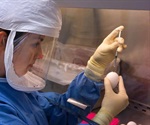

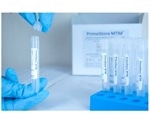

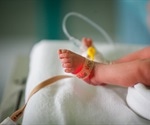
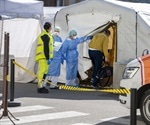
_c4032ceb6a724ffa869085821ca110ee-150x125.jpg)
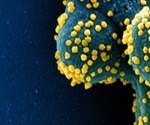

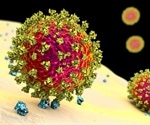
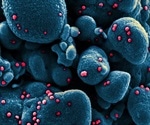
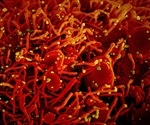

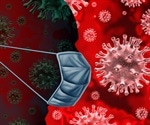
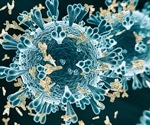
_9b79df6961ce4642ba691937cf7a80cd-150x125.jpg)

































No hay comentarios:
Publicar un comentario